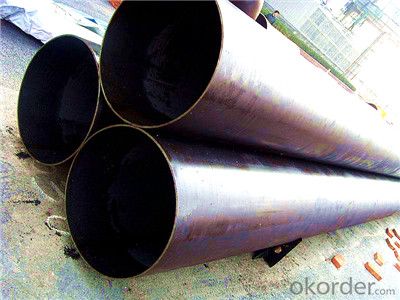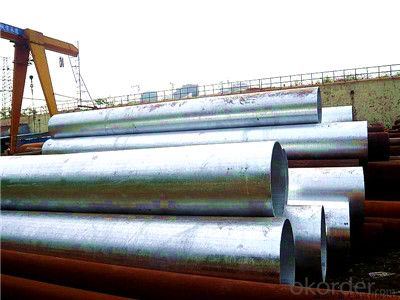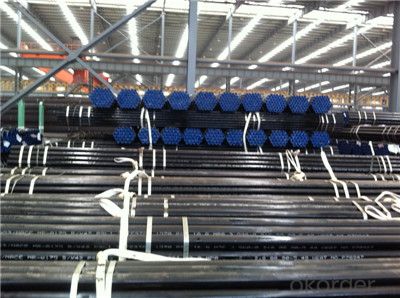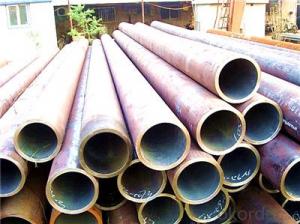High strength reasonable price Seamless Steel pipe with high quality
- Loading Port:
- Tianjin
- Payment Terms:
- TT or LC
- Min Order Qty:
- 50 m.t.
- Supply Capability:
- 30000000 m.t./month
OKorder Service Pledge
OKorder Financial Service
You Might Also Like
PRODUCT DETAILS
1.Structure of Seamless Steel Pipe Description:
A large amount of Seamless Steel Pipes is offered to the clients at cost effective rates. These pipes are extremely durable, resistant to corrosion and have high tensile strength. Our pipes are used in nuclear plants, power plants, refineries and construction industry across the country. Furthermore, we are capable of providing these seamless pipes to the clients in bulk quantity.
2.Main Features of the Steel Pipe:
• High manufacturing accuracy
• High strength
• Small inertia resistance
• Strong heat dissipation ability
• Good visual effect
•Reasonable price
3.Packaging & Delivery:
| Packaging Details: | Seaworthy packages, bundles wrapped with strong steel strip |
| Delivery Detail: | 15-30 days after received 30% TT |
4.Seamless Steel Pipe Specification:
| Standard: | GB, DIN, ASTM,ASME, ASTM A106-2006, ASTM A53-2007 |
| Grade: | 10#,20#, 45#, 16Mn |
Thickness: | 8 - 33 mm |
| Section Shape: | Round |
| Outer Diameter: | 133 - 219 mm |
| Place of Origin: | Shandong, China (Mainland) |
| Secondary Or Not: | Non-secondary |
| Application: | Hydraulic Pipe |
| Technique: | Cold Drawn |
| Certification: | API |
| Surface Treatment: | factory state or painted black |
| Special Pipe: | API Pipe |
| Alloy Or Not: | Non-alloy |
| Length: | 5-12M |
| Outer Diameter: | 21.3-610mm |
5.Product pictures



5.FAQ of Seamless steel pipe:
①How is the quality of your products?
Our products are manufactured strictly according to national and internaional standard, and we take a test
on every pipe before delivered out. If you want see our quality certifications and all kinds of testing report, please just ask us for it.
Guaranteed: If products’ quality don’t accord to discription as we give or the promise before you place order, we promise 100% refund.
②How about price?
Yes, we are factory and be able to give you lowest price below market one, and we have a policy that “ for saving time and absolutely honest business attitude, we quote as lowest as possible for any customer, and discount can be given according to quantity”,if you like bargain and factory price is not low enough as you think, just don’t waste your time.Please trust the quotation we would give you, it is professional one.
③Why should you chose us?
Chose happens because of quality, then price, We can give you both.Additionally, we can also offer professional products inquiry, products knowledge train(for agents), smooth goods delivery, exellent customer solution proposals.Our service formula: good quality+good price+good service=customer’s trust.
SGS test is available, customer inspection before shipping is welcome, third party inspection is no problem.
Any question, pls feel free to contact us !
- Q:How are steel pipes used in the pulp and paper industry?
- Steel pipes are widely used in the pulp and paper industry for various applications. They are primarily used for conveying corrosive chemicals, hot water, steam, and other fluids throughout the production process. Steel pipes provide high strength, durability, and resistance to corrosion, which is crucial in an industry where harsh chemicals are involved. They are used in the transportation of pulp, bleaching agents, and various liquids within the production facilities, ensuring efficient and reliable operations in the pulp and paper industry.
- Q:How are steel pipes used in the construction of oil-fired power plants?
- Steel pipes are used in the construction of oil-fired power plants for various purposes such as transporting oil, steam, and hot gases, providing structural support, and ensuring efficient heat transfer. They are used for oil and fuel supply lines, steam and water circulation systems, exhaust gas systems, and other critical infrastructure where high pressure and high temperatures are involved. The durability, strength, and corrosion-resistant properties of steel pipes make them an ideal choice for such applications, ensuring the safe and reliable operation of oil-fired power plants.
- Q:What are the different methods of transporting steel pipes?
- The different methods of transporting steel pipes include using trucks, trains, ships, and pipelines. Trucks are commonly used for short-distance transportation, while trains and ships are used for long-distance transportation. In some cases, steel pipes can also be transported through pipelines, especially for oil and gas applications. Each method has its own advantages and considerations, such as cost, capacity, and accessibility.
- Q:How are steel pipes used in the manufacturing of telecommunications infrastructure?
- Steel pipes are commonly used in the manufacturing of telecommunications infrastructure for various purposes such as underground cable protection, overhead cable support, and antenna mounting. They provide durability, strength, and corrosion resistance, ensuring the longevity and reliability of the infrastructure. Additionally, steel pipes allow for easy installation and maintenance of telecommunications equipment, making them an essential component in the industry.
- Q:Are steel pipes affected by magnetic fields?
- Yes, steel pipes can be affected by magnetic fields. Steel is a ferromagnetic material, which means it can be magnetized and influenced by magnetic fields.
- Q:What is the difference between steel pipe and ductile iron pipe?
- Steel pipe and ductile iron pipe are both commonly used in various industries for transporting fluids and gases. However, there are some key differences between the two materials. One of the main differences is their composition. Steel pipe is made primarily of iron and carbon, with other alloying elements added to enhance its strength and corrosion resistance. On the other hand, ductile iron pipe is a form of cast iron that has been treated to improve its ductility and toughness. It contains higher amounts of carbon and silicon, along with small amounts of other elements such as magnesium and copper. Another difference is their strength and durability. Steel pipe is known for its high strength and can withstand higher pressures and stresses compared to ductile iron pipe. It is also more resistant to impact and bending, making it suitable for applications where high strength is required. Ductile iron pipe, although not as strong as steel, still offers good strength and durability, especially in applications where there is a risk of external damage or heavy loads. Corrosion resistance is another factor to consider. Steel pipe is typically more resistant to corrosion due to the addition of alloying elements such as chromium and nickel. This makes it suitable for applications where there is a high risk of corrosion, such as pipelines carrying corrosive fluids. Ductile iron pipe, while also having some corrosion resistance, may require additional protective coatings to enhance its durability in corrosive environments. Installation and maintenance are also different for these two types of pipes. Steel pipe is generally lighter and easier to handle, making it easier to install. It can also be welded, which allows for more flexibility in the construction process. Ductile iron pipe, being a cast iron material, requires more specialized installation techniques, such as using mechanical joints or flanges. It is also more prone to cracking during installation if not handled properly. In terms of cost, steel pipe is generally more expensive than ductile iron pipe. This is due to the higher cost of raw materials and the additional processing required to produce steel pipe. However, it is important to consider the overall lifecycle cost, as steel pipe's higher strength and corrosion resistance may result in lower maintenance and replacement costs in the long run. In summary, while both steel pipe and ductile iron pipe have their own advantages and applications, the choice between the two depends on factors such as strength requirements, corrosion resistance, installation methods, and budget considerations. Careful consideration of these factors will help determine which pipe material is most suitable for a specific application.
- Q:Are steel pipes suitable for underground compressed air systems?
- Generally, steel pipes are suitable for underground compressed air systems. They are a popular choice due to several advantages they possess. First and foremost, steel pipes are renowned for their strength and durability. This enables them to withstand the pressure and stress associated with compressed air systems. They can handle high operating pressures without the risk of bursting or leaking. Secondly, steel pipes exhibit excellent resistance to corrosion. They can endure exposure to moisture, soil, and other elements found underground. This reliability makes them ideal for underground installations where pipes may encounter potentially corrosive substances. Moreover, steel pipes are relatively easy to install and maintain. They can be securely connected through welding or threading, ensuring a leak-free connection. Additionally, inspecting and repairing steel pipes is a simple process, allowing for cost-effective maintenance and repairs. Nevertheless, it is important to consider other factors that may impact the suitability of steel pipes for underground compressed air systems, such as specific requirements and conditions. Consulting a professional engineer or qualified expert is advisable to determine the most appropriate choice for a particular application.
- Q:Can steel pipes be used for swimming pool installations?
- Indeed, swimming pool installations can make use of steel pipes. Renowned for their robustness and power, steel pipes emerge as an apt alternative for both subterranean and aboveground swimming pool plumbing systems. These pipes possess the capacity to endure elevated water pressure and resist the deteriorating impact of pool chemicals. Moreover, steel pipes exhibit resilience against harsh weather conditions and can be effortlessly installed and maintained. Nevertheless, it remains crucial to guarantee appropriate treatment and coating of the steel pipes to avert rust and corrosion.
- Q:What is the role of steel pipes in HVAC systems?
- Steel pipes are crucial components in HVAC systems as they are used to transport hot and cold water throughout the system. They provide a durable and reliable means of distributing heat or cooling energy to various parts of a building. Steel pipes are known for their high strength and resistance to corrosion, making them an ideal choice for HVAC applications.
- Q:What is the purpose of a steel pipe coating?
- The purpose of a steel pipe coating is to provide protection to the pipe from corrosion and other environmental factors that can lead to deterioration. Coating the pipe with a layer of material helps to create a barrier between the steel and the surrounding environment, preventing direct contact and reducing the risk of corrosion. This is especially important for pipes that are used in industries such as oil and gas, water distribution, and construction, where they are exposed to harsh conditions such as moisture, chemicals, and extreme temperatures. The coating also helps to enhance the durability and longevity of the pipe, ensuring that it can withstand the demands of its intended application. Additionally, certain types of pipe coatings can also provide insulation properties, preventing heat loss or transfer in applications where temperature control is critical. Overall, the purpose of a steel pipe coating is to protect the pipe, extend its lifespan, and ensure its optimal performance in various industries and environments.
1. Manufacturer Overview |
|
|---|---|
| Location | |
| Year Established | |
| Annual Output Value | |
| Main Markets | |
| Company Certifications | |
2. Manufacturer Certificates |
|
|---|---|
| a) Certification Name | |
| Range | |
| Reference | |
| Validity Period | |
3. Manufacturer Capability |
|
|---|---|
| a)Trade Capacity | |
| Nearest Port | |
| Export Percentage | |
| No.of Employees in Trade Department | |
| Language Spoken: | |
| b)Factory Information | |
| Factory Size: | |
| No. of Production Lines | |
| Contract Manufacturing | |
| Product Price Range | |
Send your message to us
High strength reasonable price Seamless Steel pipe with high quality
- Loading Port:
- Tianjin
- Payment Terms:
- TT or LC
- Min Order Qty:
- 50 m.t.
- Supply Capability:
- 30000000 m.t./month
OKorder Service Pledge
OKorder Financial Service
Similar products
New products
Hot products
Related keywords































